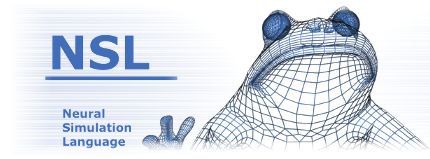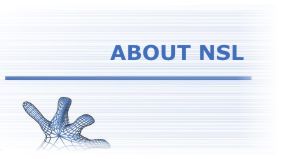NSL, Neural
Simulation Language, is a simulation system for large-scale general
neural
networks. NSL provides a simulation environment simplifying the
task of modeling neural networks. In particular, NSL supports neural
models having as basic data structure neural layers with similar properties
and similar connection patterns, where neurons are modeled as leaky
integrators with connections subject to diverse learning rules. Development
of NSL has gone hand in hand with modeling of neural mechanisms underlying
visuomotor coordination, with special emphasis on the analysis of data
from anurans, monkeys, and humans. NSL follows an object-oriented design,
providing higher level programming abstraction corresponding to neural
elements. NSL provides system development tools, such as visualization
capabilities and a run-time interpreter, which give the user powerful
tools in developing and analyzing models. NSL has been widely used throughout
the world for both teaching and research.
Current development
goals of NSL are to link between the multiple levels of neural modeling
and express the fact that neural networks can themselves be interconnected
in a hierarchical way, creating higher level assemblages, such as those
explained in the schema model in ASL - Abstract
Schema Language. We are currently working on a soon to be released
book on NSL3.0.
Project Directors
- Alfredo Weitzenfeld (USF)
- Michael Arbib (USC)
Acknowledgements:
|
NSL ITAM Team
|
NSL USC Team
|
NSL USF Team
|
- Eric Galicia
- Pablo Olmos
- Héctor De Labastida
- Josué Rojas
- Rodolfo Cartas
- Carlos Aquiles
- Ramón Bórquez
- Sebastián Gutiérrez
- Salvador Mármol
- Oscar Pequero
- Claudia Calderas
- Mirlette Islas
- Francisco Peniche
- Francisco Otero
- Rafael Ramos
- Munir Estevanné
- Alejandra Barrera
|
- Isaac Ta-yan Siu
- Danjie Pan
- Erhan Oztop
- George Kardaras
- Nikunj Mehta
- Tejas Rajkotia
- Weifanf Xie
- Nitin Gupta
- Salvador Mármol
- Amanda Alexander
|
- Martin Llofriu
- Gonzalo Tejera (UDELAR)
|



